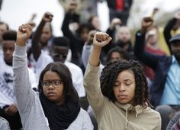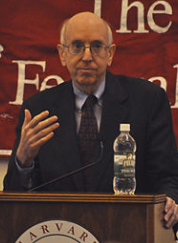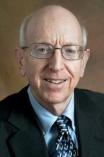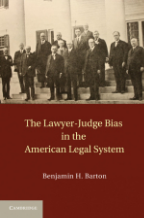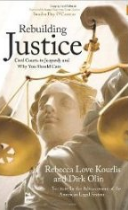...................2016 Presidential Campaign Issues...................
This page has some of the 2016 campaign issues. I did not show every issue, or even most of the issues, given the limited space available here. Fortunately I previously covered many issues on the Justice Network on single-issue pages, see the topics above.
2. Regulatory capture; includes healthcare
Racism in the United States
Wikipedia
Racism and ethnic discrimination in the United States has been a major issue since the colonial era and the slave era. Legally or socially sanctioned privileges and rights were given to White Americans that were not granted to Native Americans, African Americans, Asian Americans, and Latin Americans. European Americans (particularly WASPs) were granted exclusive privileges in matters of education, immigration, voting rights, citizenship, land acquisition, and criminal procedure over periods of time extending from the 17th century to the 1960s. However, non-Protestant immigrants from Europe; particularly Irish people, Poles, and Italians, suffered xenophobic exclusion and other forms of ethnicity-based discrimination in American society, and were not considered fully white. In addition, West Asian groups like Jews and Arabs have faced continuous discrimination in the United States, and as a result, some people belonging to these groups do not identify as white. East and South Asians have similarly faced racism in America. Read more
An Open Letter to All Those Who Would Be President
An Open Letter to All Those Who Would Be President
By Kirk Douglas
Huffington Post
Posted: 07/13/2015 9:52 pm EDT
Updated: 07/13/2015 9:59 pm EDT
If you want my vote in November of 2016, I am asking you to do something right now.
America has never formally acknowledged and apologized for the unspeakable evil of slavery. So I am asking Republicans and Democrats alike to apologize to the American people. Our continued refusal to apologize for slavery still shames and divides our nation. It is past the time to heal.
I have lived a long time -- 98 years -- and I have seen many incredible things.
I remember the days when the Ku Klux Klan was very powerful. They burned crosses on lawns.
I remember when there were segregated drinking fountains and bathrooms.
I've even lived long enough to see a black man elected president -- twice. Incredibly, he now lives in a house that was built by slaves.
I hope to live long enough to see one of the candidates promise an apology for slavery. We cannot erase our history, but we can pledge that hatred will be banished from our great land.
I look forward to your reply. Kirk Douglas, Wikipedia
.............................One Word Episodes....................................
The Google Bus: Privilege and Economic Class War
How private buses became a symbol of San Francisco's divide
PBS News Hour
Every weekday morning, dozens of sleek buses roll through the heart of San Francisco, picking up a cargo of workers commuting south to companies like Google, Facebook and Apple. But critics say the buses are clogging city bus stops and are symbolic of the disparity in wealth between the new tech workers and the long-time working class residents. Special correspondent Spencer Michels reports.
How to Fix Washington D.C. for the Common Good
Attorney Philip K. Howard of Common Good says move govt. agencies out of Washington, and the people will follow, see Howard’s article in the Daily Beast.
Howard says one problem with Washington is a lack of accountability.
"Washington has a bad culture. It always had the venality of capital cities, but it became far worse as a result of institutional design changes after the 1960s, which basically replaced individual responsibility with detailed rules. Human agency disappeared into a huge hairball of bureaucracy. Ceding authority to mindless rules put the culture in a tailspin."
Our broken legal system - and how to fix it
The Crisis of Capitalist Democracy, Judge Posner
Richard Posner
Wikipedia
Richard Allen Posner (born January 11, 1939) is an American jurist and economist, who is a judge on the United States Court of Appeals for the Seventh Circuit in Chicago and a Senior Lecturer at the University of Chicago Law School. He is a leading figure in the field of law and economics, and was identified by The Journal of Legal Studies as the most cited legal scholar of the 20th century.[1]
Posner is the author of nearly 40 books on jurisprudence, economics, and several other topics, including Economic Analysis of Law, The Economics of Justice, The Problems of Jurisprudence, Sex and Reason, Law, Pragmatism and Democracy, and The Crisis of Capitalist Democracy. Posner has generally been identified as being politically conservative; however, in recent years he has distanced himself from the positions of the Republican party.[2] Read more
Richard A. Posner, Judge, United States Seventh Circuit Court of Appeals Senior Lecturer, University of Chicago Law School
Richard A. Posner, University of Chicago Law School
Posner says Supreme Court is 'awful,' top two justices are OK but not great
Posner says Supreme Court is 'awful,' top two justices are OK but not great
ABA Journal Daily News
By Debra Cassens Weiss
Posted Oct 25, 2016 09:20 am CDT
Updated: Circuit Judge Richard Posner says he’s writing a new book called Strengths and Weaknesses of the Legal System, and one of the weaknesses is the U.S. Supreme Court.
Posner, a judge on the Chicago-based 7th U.S. Circuit Court of Appeals, criticized the high court at a recent bookstore appearance for a new Posner biography written by William Domnarski, Above the Law reports. Here is what Posner said:
The new book is "almost entirely about the federal judiciary…. So I have about 10 pages on the strengths and about 320 pages on the weaknesses. I’m very critical. I don’t think the judges are very good. I think the Supreme Court is awful. I think it’s reached a real nadir."
Above the Law reviewed the C-SPAN video of Posner’s remarks and published his Supreme Court criticisms.
Posner said "probably only a couple of the justices," namely Ruth Bader Ginsburg and Stephen G. Breyer, "are qualified. They’re OK, they’re not great." Those justices’ opinions, he said, are "readable, and sometimes quite eloquent. The others, I wouldn’t waste my time reading their opinions."
The "most tedious opinion I’ve ever read," Posner said, was the dissent by Justice Samuel A. Alito Jr. in Whole Woman’s Health v. Hellerstedt, which overturned Texas abortion-clinic regulations. The 40-page dissent said the case should have been dismissed on the basis of res judicata because the plaintiff challenging the law had filed a previous case that was dismissed. Res judicata, Posner said, is a common law rule that is "not part of the Constitution or anything, and this is an important issue we’re trying to get settled—so why should you fuss with res judicata, especially for 40 pages?"
Posner said a weak federal judiciary can be blamed on appointing politicians who are more interested in politics rather than in good judges. He also said appellate and Supreme Court law clerks—who are typically very good and smart—are part of the problem.
"So the politicians figure," Posner said, "well, we’re appointing this person because he or she is of a particular race, or comes from a special part of the country, or this or that, or is liberal or is conservative. And this person is not particularly bright and doesn’t have much experience—never been in a trial courtroom, for example—but, there are all these brilliant law clerks working, so their opinions will be all right, because the law clerks will write them…. That’s a very serious deficiency in our system, and there are zillions more."
Posner went on to say that appellate judges should have trial experience, and they could get it—as he does—by sometimes sitting by designation as trial judges.
Posner later qualified his comments in a message to Above the Law.
Posner said his comment about only two justices being “qualified” wasn’t meant to suggest that the justices lack the necessary “paper credentials.”
His use of the word “qualified,” Posner said, “meant good enough to be a Supreme Court justice. There are something like 1.2 million American lawyers, some of whom are extremely smart, fair minded, experienced, etc. I sometimes ask myself: whether the nine current Supreme Court justices (I’m restoring Scalia to life for this purpose) are the nine best-qualified lawyers to be justices. Obviously not. Are they nine of the best 100? Obviously not. Nine of the best 1,000? I don’t think so. Nine of the best 10,000? I’ll give them that.”
Posner also said he didn’t mean to suggest that only former trial judges should be appointed to the Supreme Court, but rather that all appellate judges should have tried cases, or should get experience by sitting by designation.
“I know I said some harsh things in my bookstore talk about the Supreme Court and the justices,” Posner added in his statement to Above the Law. “I stand by all that. I think the court is at a nadir. I don’t think it’s well-managed, and I don’t think the justices are doing a good job. Of course that is not a case that I can make in a bookstore talk. I am writing a book about the federal judiciary which contains a chapter of more than one hundred pages setting forth my views of the current court and my grounds for those views. So stay tuned.” Read more
Judge Richard Posner: SCOTUS is not a real court
Posner has ‘absolutely no desire’ to join SCOTUS, which
‘isn’t a real court’
ABA Journal Law News Now
By Debra Cassens Weiss
November 11, 2013
Judge Richard Posner gets a lot of attention for his opinions and his writing, but he’s not looking to leverage his fame to join the U.S. Supreme Court.
Posner explained why he isn’t interested in an interview with the Daily Beast about his compulsive writing habits. "First, I’m too old," Posner said. "I’m 74 and they don’t appoint people my age."
The reviewer notes that Posner sounds "peppy," spurring the Chicago-based federal appeals judge to elaborate.
"Well, I don’t like the Supreme Court," Posner says. "I don’t think it’s a real court. I think of it as basically ... it’s like a House of Lords. It’s a quasi-political body. President, Senate, House of Representatives, Supreme Court. It’s very political. And they decide which cases to hear, which doesn’t strike me as something judges should do. You should take what comes. When you decide which case to hear it means you’ve decided the cases ahead of time.
"Also, because I’m a compulsive writer, I like to write. ... If you sit with eight other people [like the Supreme Court] you only get one-ninth of the cases to write. I’m not interested in that. Now the Supreme Court justices write very, very few majority opinions. Last year they saw 74 cases. Divide that by nine and that’s a little more than eight opinions a year. That’s ridiculous! I write around 90 opinions a year."
Posner says Supreme Court justices do boost their totals through dissenting and concurring opinions, but they don't attract much interest. "I just wouldn’t enjoy the Supreme Court," Posner says. "Absolutely no desire to be on it."
Posner also reveals in the interview that he works from home at least half the time, and one reason is his cat, Pixie. "I’m a very big cat person," Posner says. Pixie is affectionate and "her little face falls" if Posner or his wife leaves the house. "The cat wants us at home," he says. Read more
The Lawyer-Judge Bias in the American Legal System
Professor Benjamin H. Barton author of The Lawyer-Judge Bias in the American Legal System, writes that virtually all American judges are former lawyers, a shared background that results in the lawyer-judge bias. Barton argues that these lawyer-judges instinctively favor the legal profession in their decisions and that this bias has far-reaching and deleterious effects on American law. Overlawyered, Larry Ribstein, Glenn Reynolds, and Cato’s Dan Mitchell. Barton submitted a brief with Darryl Brown, Turner v Rogers. Docket.
Attorney and journalist Amy Bach spent eight years investigating the widespread courtroom failures that each day upend lives across America. In the process, she discovered how the professionals who work in the system, however well intentioned, cannot see the harm they are doing to the people they serve. The book is Ordinary Injustice, How America Holds Court.
Winner of the 2010 RFK Book Award.
- Book review Washington City Paper
- Book review Scott Greenfield
- Justice by the Numbers New York Times
- ABA Journal Ordinary Injustice by Amy Bach
U.S. Civil Court System Needs Major Overhaul, New Book Declares
PBS News Hour
October 18, 2011
A new book, "Rebuilding Justice: Civil Courts in Jeopardy and Why You Should Care," argues Americans don't understand how the courts work and that the system itself needs a major
overhaul. Ray Suarez talked with the book's co-author on the campus of Georgetown University Law Center's Supreme Court Institute.
RAY SUAREZ: Well, the book reads like a 230-page indictment. What's the problem?
REBECCA LOVE KOURLIS: Well, it's not that complicated -- or it shouldn't be. If you get in a car wreck, and there's an argument about who should be paying damages, your
assumption is that you can go to court to have that case resolved. The truth of the matter is that's probably the last place you want to be, because the fees and the costs will ultimately be more
than your car is worth, even if you drive a really nice car. PBS News Hour
Publisher: Fulcrum Publishing
Institute for the Advancement of the American Legal System, IAALS: Authors Rebecca Love Kourlis and Dirk Olin tell the story of a civil justice system that has become alarmingly expensive, politicized, and time-consuming, degrading it to the point that it no longer meets the legitimate needs of the people it was created to serve. IAALS Facebook
CommonGood YouTube Channel
Published on Jul 12, 2016
Something has gone terribly wrong. An overgrown jungle of complex laws has created stagnation in our country, and removed people's ability to exercise judgement and common sense. Something needs to be done to simplify the law, remove unnecessary rules, and put humans in charge again.
Learn More: http://www.Take-Charge.org/
Twitter: http://bit.ly/2a6TTog
Facebook: http://bit.ly/29FyJQM
Instagram: http://bit.ly/29BRgKh
U.S. judges see 'epidemic' of prosecutorial misconduct
 Federal judges called upon state Atty. Gen. Kamala D. Harris to respond to reports of a pattern of prosecutorial misconduct going undisciplined in state courts. (Damian Dovarganes / Associated Press)
Federal judges called upon state Atty. Gen. Kamala D. Harris to respond to reports of a pattern of prosecutorial misconduct going undisciplined in state courts. (Damian Dovarganes / Associated Press)
U.S. judges see 'epidemic' of prosecutorial misconduct in state
Los Angeles Times
By Maura Dolan
January 31, 2015
The hearing seemed largely routine until a state prosecutor approached the lectern.
Deputy Atty. Gen. Kevin R. Vienna was there to urge three judges on the U.S. 9th Circuit Court of Appeals to uphold murder convictions against Johnny Baca for two 1995 killings in Riverside County. Other courts had already determined that prosecutors had presented false evidence in Baca's trial but upheld the verdicts anyway.
Vienna had barely started his argument when the pummeling began.
Judge Alex Kozinski asked Vienna if his boss, Atty. Gen. Kamala D. Harris, wanted to defend a conviction "obtained by lying prosecutors." If Harris did not back off the case, Kozinski warned, the court would "name names" in a ruling that would not be "very pretty."
Judge Kim Wardlaw wanted to know why Riverside County prosecutors presented a murder-for-hire case against the killer but did not charge the man they said had arranged the killings.
"It looks terrible," said Judge William Fletcher.
The January hearing in Pasadena, posted online under new 9th Circuit policies, provided a rare and critical examination of a murder case in which prosecutors presented false evidence but were never investigated or disciplined.
The low-profile case probably would have gone unnoticed if not for the video, which attorneys emailed to other attorneys and debated on blogs.
In a series of searing questions, the three judges expressed frustration and anger that California state judges were not cracking down on prosecutorial misconduct. By law, federal judges are supposed to defer to the decisions of state court judges.
Prosecutors "got caught this time but they are going to keep doing it because they have state judges who are willing to look the other way," Kozinski said. Read more
Link to video 13-56132 Johnny Baca v. Derral Adams, Richard I. Chambers U.S. Courthouse, Courtroom I, Pasadena, California
Capitalism at the Crossroads - Hernando de Soto: An Honest Legal System Matters: Trickle-up Economics
Jobs With Justice - Non-Profit Organization
Jobs With Justice:
New Campaigns Take Aim At Low Wages, Working Poor, Falling Middle Class
Forbes / Entrepreneurs
Tom Watson, Contributor
Dec 23, 2013
The organized labor movement is changing, reflecting two large-scale trends. On the one hand, union membership – once 35 percent of the U.S. workforce in the 1950s – is at its lowest point in more than a century. In parallel, the wealth gap in the U.S. is also at record levels.
Jobs With Justice is one of a number of fast-moving organizations creating new campaigns to bring workers together, create new networks, and build new coalitions for policy change. Read more
Jobs with Justice Wikipedia
You probably won't read this piece about Syria
AJE this week ran special content on a grim milestone because it's important. But our data told us something: few cared.
You probably won’t read this piece about Syria
www.aljazeera.com
Barry Malone
About the Author
There's something in her eyes. Something more than the bafflement you so often see in the faces of innocents victimised by the wars of others.
It's something that haunts. Something that reaches you most powerfully not in your mind, but somewhere more prosaic. In your guts. In your bones.
Her expression seems to plead directly. To ask of you, do you care? Do you see me?
When we saw this image, there was no other that seemed more apt to lead our website on March 15th, the day Syria entered its fifth year of misery and mayhem. Its fifth year of slaughter.
Several human rights groups, and many Syrians, had a powerful accusation to make that day. The world, they said, had failed the country and her people. The world didn't care anymore. Read more
Kunduz Hospital Bombing by a U.S. gunship
Kunduz Hospital Bombing by a U.S. gunship
In the early morning hours of October 3, a U.S. gunship repeatedly bombed a Doctors Without Borders/Médecins Sans Frontières (MSF) hospital in Kunduz, in northern Afghanistan. The attacks killed 30 people, including 13 MSF staff members, 10 patients,

